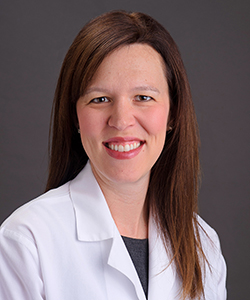December 19, 2023

Your primary care physician (PCP) is often the only doctor you consistently see — or should see — every year from the day you’re born until the day you die. By the time you’re in your 20s or 30s, you may feel like you know the drill for check-ups: height, weight, blood pressure, say “ahhh.”
While those measurements are essential, they aren’t the only focus of annual well visits. Your health shifts and changes as you age. And knowing the questions to ask your PCP at each stage of your life will ensure you get the most from your appointments.

To better understand how to partner with your PCP and personalize your care, we turned to Dr. Sarah Swofford, an MU Health Care family medicine doctor. She explains the questions you should be asking at each stage and how your primary care may change over time.
What to Ask at Your Annual Physical Exams
The goal of primary care is to help you develop into a healthy adult and maintain that health. But that care is meant to be interactive. Don’t be shy about asking questions — think of your PCP as your personal health guru.
“Your PCP is your first point of contact,” Dr. Swofford says. “Studies show that about 85% of a person’s health care needs can be addressed by their PCP. And when an issue requires referral to a specialist, your PCP can help you find the best fit.”
Dr. Swofford outlines what your care will focus on — and what important questions to ask — during the six main primary care phases:
Ages 0 to 17: “Is My Child Developing Normally and How Can I Best Support Their Growth?”
Primary care during childhood goes through various stages. But overall, the focus is on general health and development.
“Pediatrics involves a lot of developmental surveillance,” Dr. Swofford says. “We assess development intensely during the infant and toddler years. But even as children grow to school age and older, we’re paying close attention to physical, emotional, social and intellectual development.”
Pediatric doctors partner with parents and guardians, helping them encourage development while keeping children safe. Ask your child’s doctor about:
- Risk assessments for your child, typically based on a family health history
- Screening for vision, heart, hearing and mental health issues
- Vaccinations, making sure your child receives them at the appropriate time
Ages 18 to 35: “What Are the Best Choices I Can Make for Myself and My Future Family?”
Having a trusted adult primary care provider is essential, and this is the time to get one. “As a young adult, you may move a lot and spend time away from your family,” Dr. Swofford says. “It’s critical to understand the health care system as an adult and establish a PCP wherever you are.”
As your PCP gets to know you, your lifestyle and your plans for creating a family, ask about:
- Cervical cancer screening, which begins at age 21 and repeats every three years until age 30, then repeats every five years
- Drug and alcohol use to understand how your substance use may affect your health
- Mental health and the best ways to manage stress
- Reproductive and sexual health, including family planning, contraception and screening for sexually transmitted infections (STIs)
During this time, your PCP will want your family health history so they can tailor your care. “By your mid-30s, you should have good knowledge of your family history,” Dr. Swofford says. “Learn what’s been diagnosed in your family and the age at diagnosis.” Once you have that information, ask your doctor how it should guide your lifestyle choices.
Ages 36 to 45: “What Can I Do to Prevent Chronic Diseases?”
The late 30s and early 40s involve a lot of preventive care and address the importance of healthy lifestyle choices with regard to nutrition, smoking, exercise and drinking. “You start to lose muscle mass at age 40 unless you do something to prevent it,” Dr. Swofford says. “So your PCP may emphasize the importance of strength training.”
Ask your PCP about your risk for chronic diseases and when you should consider:
- Breast cancer screening, which begins at age 40 for people of average risk
- Cardiovascular health screening, assessing blood pressure, cholesterol and weight
- Colon cancer screening, which begins at age 45 for people of average risk
- Diabetes screening, typically based on individual risk factors
- Skin cancer screening, after decades of sun exposure
Ages 46 to 55: “How Can I Stay Healthy as I Age?”
Screenings and preventive care for heart health, diabetes, mental health and cancer continue, though your PCP may recommend a few new screenings. You’ll also want to make sure you’re up to date with vaccines.
Ask about new health concerns that often crop up during this age range, such as:
- Bone and muscle strength: Your PCP can help you identify strategies to maintain both.
- Lung health: Lung cancer screening begins at age 50 for those with a significant smoking history.
- Prostate health: Prostate cancer screening begins at age 50.
- Shingles prevention: The shingles vaccine is available to people at age 50.
- Transition to menopause (perimenopause) and menopause: Your PCP can help you manage perimenopausal symptoms and post-menopausal health changes.
“During this time, you may notice changes to your body, physically and mentally,” Dr. Swofford says. You may experience joint pain, arthritis or memory issues. “You’ll want to be in tune with your body and aware of things that feel different. Then, address those issues with your PCP.”
Ages 56 to 64: “What Should I Do Now to Ensure I’m Healthy in Retirement?”
This age range can be a time of transition for many people. You may suddenly be an empty nester or starting to think about retirement. As during any life change, your doctor may focus on mental health and touch upon substance use (alcohol, tobacco and drugs) — which can sometimes accompany depression and anxiety. Ask your PCP to connect you with specialists or resources if you have concerns or notice a change in your habits.
You should also ask your primary care provider about:
- Continued screening for heart health, diabetes, mental health and cancer
- Menopause and the health changes that follow it
- Osteoporosis (bone density) screening, recommended at age 60 for women at high risk and at age 65 for those at average risk
- RSV (respiratory syncytial virus) vaccine, available as a single dose to people 60 and older
Age 65 and older: “What Are the Best Health Care Choices For Me at This Point in My Life?”
Your family and personal health history often guide primary care after age 65. You should begin discussing advanced care planning and ask your PCP if you should be seeing a specialist for any concerning conditions or risk factors.
After age 65, the guidelines for some cancer screenings change. Ask how long you should continue:
- Breast cancer screening, which may decrease to every two years — though you can still get a yearly mammogram if you choose
- Cervical cancer screening, which ends at 65 if you’ve had regular screenings and normal results for the past decade
- Colon cancer screening, which may end at age 75 for some people
- Lung cancer screening, which continues until age 80 for those at increased risk
Other preventive care you may have questions about includes:
- AAA (abdominal aortic aneurism) screening for men aged 65 who were previous smokers
- Bone density (osteoporosis) screening begins at 65 for people of average risk
- Pneumococcal vaccination at age 65 to protect against pneumonia
- Stronger flu shots, available to anyone 65 and older
“Your PCP can provide a personalized health assessment and care plan looking at your conditions, medications and family history,” Dr. Swofford says. “And if you’ve had primary care consistently through the years, you’re giving yourself the best shot at a long and healthy life.”
Next Steps and Useful Resources
- Want to discuss more with a primary care doctor? Find one today.


